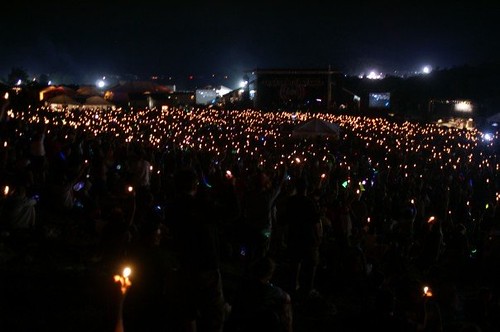Just finished Change of Heart by Jodi Picoult. I took a really long time to finish this because I started before my exam, then I took a long pause to study, and then resumed and finished it today. This is the second book I'm reading, written by Jodi. I realize that she doesn't send the reader to a surprise ending. Both the books I've read (the other is Nineteen Minutes) had predictable endings way early from the beginning. Well, its not really the ending I would say. Its the twist? lets call it that for now.
Basically the story revolves around a convicted murderer who wants to donate his heart to the second daughter of the victim (of which he killed the husband and the first daughter). Well, at least that's the case they accused him with. Finally Picoult turns the table about him being the Messiah. His best friend in prison, Lucius, whom most believed was cured from AIDS, eventually died from AIDS related pneumonia (well, as medical student - sepsis secondary to pneumonia). Also, he had ample packets of bubblegum which they thought he multiplied like Jesus did, and the Gospel of Thomas quotation, he basically memorized off a book page. Jodi intentionally left out the truth of the murder, I think. No one would know what really happened. A guy tells you four stories, and three of them turns out to be fake. Do the math. Picoult leaves that unattended. You get to choose whether he was innocent or not.
What difference does it make, whether he is innocent or not? What was the whole point of the Messiah stage? If viewed from his whole messianic act, his story of saving the first daughter was true. The whole stage was planned only to make sure his heart was donated second daughter successfully. Basically, he wanted to do something, and for that, he was willing to do anything else, even up to the extent of suggestively declaring himself The Messiah. Through acquired sympathy, multiple pairs of knees were bent in vigils outside the prison, and even the Amazing Grace hymn was blown through bagpipes right before his death. No matter what it took, he wanted to donate his heart, and he saw it through till the end.
The most emotional part was the moment when Claire, the second daughter, while in the hospital, wrote on a board (because she was intubated and couldn't speak) to communicate with her mother saying, "Let me go". It was so sad, I teared up. The best painted image was Shay's execution itself. I loved the words used to paint a very clear image of how a 'hanging' would happen. I have to quote it.
"...in macabre silhouette: the hood being placed over Shay's head, the noose being tightened against his neck, the two officers who'd secured him stepping backward.
"Goodbye," I whispered.
Somewhere, a door slammed, and suddenly the trap was open and the body plummeted, one quick firecracker snap as the weight caught at the end of the rope. Shay slowly turned counterclockwise with the unlikely grace of a ballerina..."
Its the counterclockwise spin of the hanging body that got to me, compounded with the 'ballerina' effect. The whole scene was perfectly described. There are many phrases and quotes that are beautiful, but I guess these two are worth mentioning. Food for thought.
- Its funny how when you are dying, you still fight for the upper hand. You want to pick the terms; you want to choose the date. You'll tell yourself anything you have to, to pretend that you're still the one in control.
- If you really want to know what makes someone a killer,
ask yourself what would make you do it.
Overall, it was a great book, and I enjoyed it although I chopped up the reading timings. Everytime I finish a Picoult novel, I'm so tempted to start a new one. I told myself to slow down with Picoult and start something else in the meantime. I was thinking of the Maze Runner trilogy, but the temptation to start another Picoult is too high hahahaha. We'll see how it goes. That's all for now!

